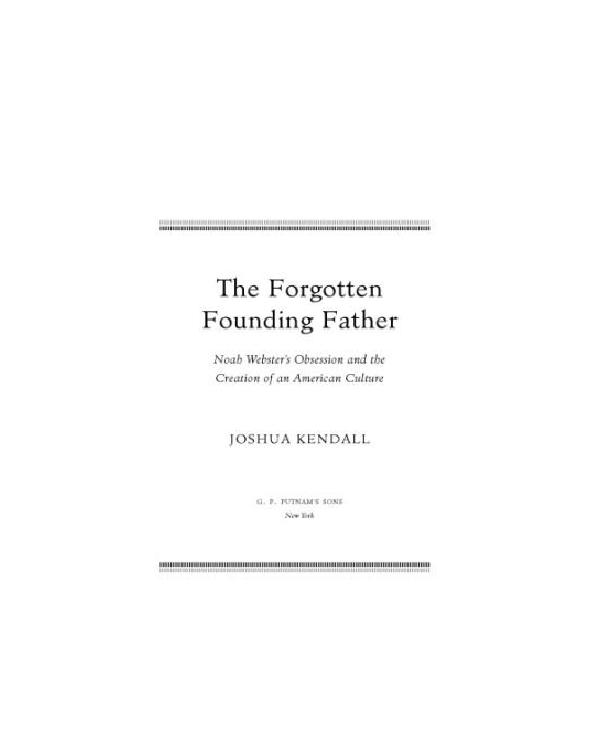
The Forgotten Founding Father
Noah Webster's Obsession and the Creation of an American Culture
کتاب های مرتبط
- اطلاعات
- نقد و بررسی
- دیدگاه کاربران
نقد و بررسی

February 7, 2011
In 1828 Noah Webster published the groundbreaking American Dictionary of the English Language and secured his niche as an avatar of a distinct American culture. Kendall (The Man Who Made Lists) honors Webster's crucial contributions to early American nationalism, which extended far beyond his primary obsession, the written word. Kendall paints a complex portrait of Webster (1758–1843), a man he claims "housed a host of contradictory identities: revolutionary, reactionary, fighter, peacemaker, intellectual, commonsense philosopher, ladies' man, prig, slick networker and loner." In spite of his flaws, Webster, Kendall argues not wholly successfully, belongs among the ranks of America's notable founders, associating with George Washington and Ben Franklin, among others, to craft an early American identity rooted in national pride and a distinctly American lexicon. Citing frequent references to Webster's nervous afflictions, Kendall ventures the somewhat shaky diagnosis of obsessive-compulsive disorder. The book includes the politics of the "forgotten" founder, for example, noting that Webster "detested Andrew Jackson as the second coming of Jefferson," and a wide range of his activities, including helping found Amherst College. Kendall provides an intriguing look at one of America's earliest men of letters that is sure to appeal to lovers of both words and history.

February 1, 2011
Freelance journalist Kendall (The Man Who Made Lists: Love, Death, Madness, and the Creation of Roget's Thesaurus, 2008) tells the story of the remarkable Noah Webster (1758–1843)—lexicographer, political theorist, journalist, co-founder of Amherst College, polymath.
The author notes that many Americans confuse Webster with his more famous distant cousin Daniel. But Kendall's biography may change that. Born on a farm in Hartford, Conn., Webster attended school only a few months a year but entered Yale in 1774, where he befriended poet Joel Barlow (with whom he fell out, over religion, many decades later). Webster became the friend and acquaintance of many of the luminaries of the American Revolution, George Washington among them, but he struggled to find a career. He tried teaching and the law, struggling in both. However, he wrote fiery pamphlets and newspaper essays and then published his famous spelling book that, off and on, enriched him, frustrated him and propelled him into celebrity. It also occasioned the genesis of the spelling bee. Kendall argues that Webster invented the author tour, a contention that is hard to deny—he traveled all over the country promoting his writing, making deals, pressing flesh, smiling and schmoozing. He was also an early abolitionist. He first found career stability in journalism, editing the Federalist newspaper American Minerva. Just before the turn of the century, he found another love: lexicography. Kendall writes that Webster had a most orderly mind, which sought to categorize and record everything. Though his was not the first American dictionary, it was by far the most thorough and influential. The American Dictionary appeared in 1828, was a quick success and lives on as Merriam-Webster's (the Merriam family joined the enterprise in 1843).
A gracefully told story that commands attention and confers on Webster deserved honor too long deferred.
(COPYRIGHT (2011) KIRKUS REVIEWS/NIELSEN BUSINESS MEDIA, INC. ALL RIGHTS RESERVED.)

March 15, 2011
Kendall (The Man Who Made Lists: Love, Death, Madness, and the Creation of Roget's Thesaurus) provides a compelling chronicle of the foremost name in American lexicography. A part of the celebrated Yale graduating class of 1778 and a lifelong social and political conservative, Noah Webster had a penchant for rubbing people the wrong way as pronounced as his knack for words. His mechanism for coping with recurrent depression, compiling data, would lead to the creation of one of the best-known works in American history. While lacking in pure literary talent, Webster was a master of self-promotion who relentlessly lobbied for extensive copyright laws, a stronger national union, and the creation of a uniquely American identity. VERDICT Though the title of Kendall's work may overplay Webster's political legacy, this is certainly a poignant look into the life of a figure who played a central role in the historical development of the American language. Kendall capably delves beyond the realm of words and into Webster's social and intellectual worlds. Recommended for fans of historical biography and early American cultural history.--Brian Odom, Pelham P.L., AL
Copyright 2011 Library Journal, LLC Used with permission.

March 15, 2011
In a natural sequel to his biography of the Roget of thesaurus fame, The Man Who Made Lists (2008), Kendall highlights the personality of Americas seminal lexicographer, humanizing the name synonymous with dictionaries. Noah Websters most salient trait, Kendall says, was obsessive/compulsive personality disorder. If thats true, it cost Webster much in society, business, and politics, as Kendalls quotations of the hostile opinions extracted from his comprehensive research attest. Webster was arrogant and tactless, but his fixations on orderliness and precision with words were indispensable to the achievement of his renowned dictionary, first published in 1828. Besides stressing the warts-and-all motif, Kendall links Webster to revolutionary Americas illustrious patriots (Webster knew Washington, Franklin, and Hamilton) and the countrys nascent literary stratum, in which his argumentative inclinations thrived, though not often profitably. Completing his well-rounded portrait, Kendall sensitively depicts the dynamics of Websters family, almost sighing over the demands the self-centered Webster placed on wife and children. Doyens of diction as well as of early American history stand to be pleased by this perceptive, fluidly written biography.(Reprinted with permission of Booklist, copyright 2011, American Library Association.)

























دیدگاه کاربران